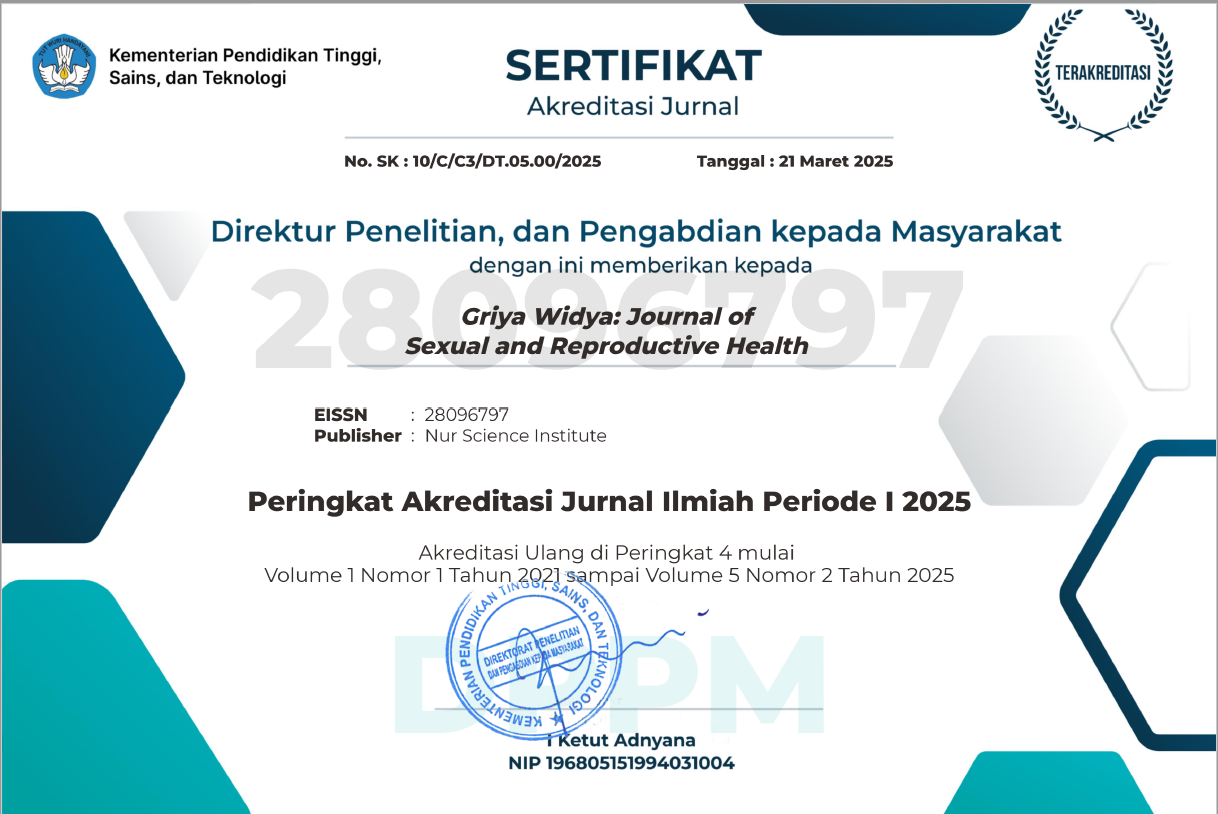Are Parents the Key to Preventing Unwanted Early Marriage Among Teenagers?
A Qualitative Study in Batangtoru District
DOI:
https://doi.org/10.53088/griyawidya.v3i2.1708Keywords:
Early Marriage, Teenagers, Parental RoleAbstract
Background: Early marriage remains a significant public health and social issue in Indonesia, particularly among adolescents. In Batangtoru District alone, 32 cases of early marriage were reported in 2024. Early marriage is closely linked to negative consequences such as school dropout, maternal health complications, and increased risk of psychological issues. The role of parents is crucial in equipping adolescents with reproductive health knowledge and in supervising their relationships to prevent early marriage.
Objective: This study aims to explore how parents fulfill their roles in preventing early marriage among adolescents in Batangtoru District, focusing on reproductive health education and monitoring of relationships with the opposite sex.
Method: A qualitative research design with a phenomenological approach was employed. Data were collected through in-depth, semi-structured interviews with five adolescent informants aged 15–18 and five parent informants. Thematic analysis was used to identify patterns in parental involvement and its perceived impact.
Results: The findings revealed that parents provided only limited reproductive health information, mostly restricted to menstruation and hygiene, and offered inconsistent supervision of adolescents’ interactions with the opposite sex. This lack of comprehensive education and structured oversight contributed to adolescents’ limited understanding of reproductive risks and allowed space for early sexual relationships, increasing the likelihood of early marriage.
Conclusion: Parental roles in preventing early marriage remain underutilized due to limited knowledge, cultural taboos around sex education, and economic constraints. Strengthening family-based interventions, especially those that enhance parent-adolescent communication and reproductive health literacy, is essential for reducing the incidence of early marriage.
References
Aisyaturridho. (2025). Nikah dini bukan pilihan (Say no to nikah dini raih impian dulu) bersama masyarakat Jorong Pemukiman Baruii Kecamatan Koto Balingka Kabupaten Pasaman Barat [Early marriage is not a choice: Say no to early marriage, pursue your dreams with the community of Jorong Pemukiman Baru II, Koto Balingka District, West Pasaman Regency]. Jurnal Karsa, 1–18.
Amelia, R. D. (2025). Kesadaran pelajar SMAN 1 Gunung Tuleh pada dampak kesehatan dan hukum perdata dalam mencegah pernikahan dini melalui edukasi pemberdayaan peran keluarga [Awareness of SMAN 1 Gunung Tuleh students on health and civil law impacts in preventing early marriage through family empowerment education]. Jurnal Humaniora, Sosial dan Bisnis, 1–13.
Astika, D. (2025). Peran keluarga terhadap keputusan remaja menikah dini [The role of the family in adolescents' decisions to marry early]. Jurnal Peran Keluarga, 6(1), 1–8.
Dungga, E. F., & Ihsan, M. (2023). Pendidikan kesehatan reproduksi pada remaja [Reproductive health education for adolescents]. Jurnal Pengabdian Masyarakat Farmasi, 1–6.
Hardika, A., & Kusumawardani, K. (2010). A study of ‘Kenry’ in Japanese and ‘Hak’ in Indonesian. Jurnal Humaniora, 22, 22–30.
Nur, R. A. (2025). Peran fasilitator KB (Keluarga Berencana) dalam pencegahan pernikahan usia dini (Studi di Desa Pawindan, Kabupaten Ciamis) [The role of family planning facilitators in preventing early marriage: A study in Pawindan Village, Ciamis Regency]. Jurnal Bintang Pendidikan Indonesia, 1–24.
Putri, F. D. (2025). Dampak pernikahan dini terhadap pendidikan dan masa depan remaja [The impact of early marriage on adolescents' education and future]. Jurnal Studi Multidisipliner, 1–5.
Sari, T. M. (2025). Peran orang tua dalam upaya pencegahan pernikahan dini di Kecamatan X [The role of parents in preventing early marriage in District X]. Laporan Penelitian, Universitas Muhammadiyah Surakarta, 1–22.
Downloads
Published
How to Cite
Issue
Section
License
Copyright (c) 2024 Yaumil Fauziah & Fitri Khairani

This work is licensed under a Creative Commons Attribution-ShareAlike 4.0 International License.
Authors who publish with this journal agree to the following terms:
The author(s) retain copyright and grant the journal the right of first publication with the work simultaneously licensed under a CC BY-SA 4.0 license that allows others to remix, adapt, and build upon the work even for commercial purposes, as long as they credit the author(s) and license their new creations under the identical terms.
License details: https://creativecommons.org/licenses/by-sa/4.0/
Most read articles by the same author(s)
- Yaumil Fauziah, Yulia Fatma Nasution, Yulia Safitri, Fluor Albus dan Remaja: Efektivitas Edukasi Personal Hygiene di Komunitas Pedesaan , Griya Widya: Journal of Sexual and Reproductive Health: Vol. 4 No. 2 (2025): Griya Widya: Journal of Sexual and Reproductive Health



